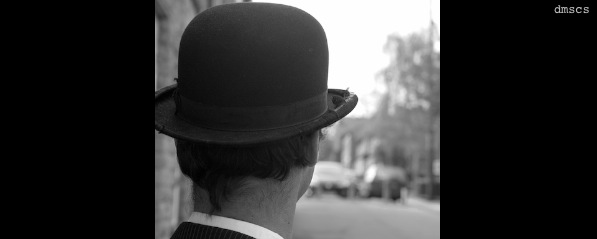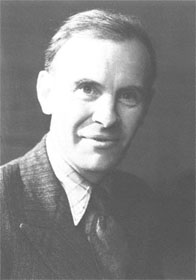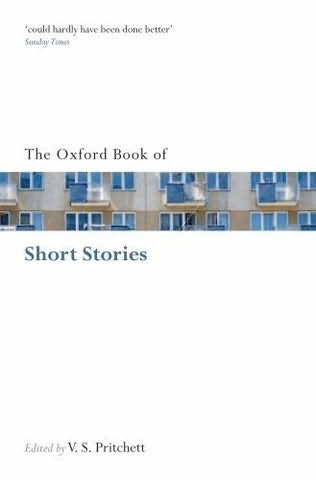
photo by dmscs
V.S. Pritchett
by Mike Smith
There is a common perception that the short story has not flourished in England. In an anthology in my possession, The English Short Story, barely half the contributors are ‘English’. Perhaps the reason for such an anomaly is not only the blurred and uncertain concept of ‘Englishness’, but also, and perhaps more significantly, England’s own assumption that it has not produced many short story writers of real note.
D.H. Lawrence, it could be argued, was more of a novelist than a short story writer. Kipling was more of an Indian writer than an English one. Although many great short story writers have come to live and work and write in Britain, often in London, where are the native writers who have risen to global prominence? Where are those writing from English experience, as others have done from American, Irish, Scottish, Russian, European or Asian origins?
I looked to antecedents from my own culture to spark against, or to follow, and I found them hard to discover. But then came V.S. Pritchett.
 I had seen references to Pritchett’s name quite often – the Royal Society of Literature’s annual V.S. Pritchett Memorial Prize, for example – yet it was a while before I came across one of his stories. The first I ever encountered was ‘Many Are Disappointed’, found in my paperback edition of the 1981 Oxford Book of Short Stories, which was edited by Pritchett himself. This is an international anthology, including English, Scottish, Irish and ‘British’ writers – a distinction I’m glad he felt able to make. In his introductory essay, Pritchett tells us a lot about the short story form. It springs, he says, from poetic rather than prosaic impulses – both the poetry and the impulsiveness, to my mind, being of importance. His own included story, ‘Many Are Disappointed’, is the tale of male cyclists encountering a woman and her daughter in an unofficial tea-room, which they have mistaken for a pub, and it has, what Prichett’s introduction calls, ‘the sense of people as strangers’.
I had seen references to Pritchett’s name quite often – the Royal Society of Literature’s annual V.S. Pritchett Memorial Prize, for example – yet it was a while before I came across one of his stories. The first I ever encountered was ‘Many Are Disappointed’, found in my paperback edition of the 1981 Oxford Book of Short Stories, which was edited by Pritchett himself. This is an international anthology, including English, Scottish, Irish and ‘British’ writers – a distinction I’m glad he felt able to make. In his introductory essay, Pritchett tells us a lot about the short story form. It springs, he says, from poetic rather than prosaic impulses – both the poetry and the impulsiveness, to my mind, being of importance. His own included story, ‘Many Are Disappointed’, is the tale of male cyclists encountering a woman and her daughter in an unofficial tea-room, which they have mistaken for a pub, and it has, what Prichett’s introduction calls, ‘the sense of people as strangers’.
Pritchett’s stories are often about lonely and disconnected individuals: widows and widowers, divorcees, loners. They are thrown together by circumstance and strive to connect, or to resist connection. One of the deeper, more intimate tales from Pritchett is ‘Blind Love’ – the story of a blind man and a disfigured woman, each of whom must surrender to the other the secret of their fear and failure, in order to give and to accept the love that is possible between them.
In so many of Pritchett’s stories, there is an uncomfortable consciousness that hangs in the atmosphere like the smell of an extinguished candle. Connections that are made seem unsafe. Disconnections seem mistaken. In addition, Pritchett always writes from a male perspective, but reading as a male, it is one with which I am never at ease. His characters view their women uncharitably; his narrators view their men with disapproval.
Pritchett’s stories are not rooted in an English rural idyll. They are not rooted in its urban myths. They are not located in any specific part of the country, nor in a particular time. They are not limited to a particular class, either in subject or in narrative perspective. The latter is perhaps the most surprising, and singles Pritchett out from other English writers (including many novelists), who seem always to write from a class-based perspective that speaks either directly to – or down to – the reader.
For sixty impressive years, Pritchett wrote about and watched the twentieth century world through an outsider’s eyes. He lived in Paris in his twenties, travelled to Ireland and Spain, lectured in America, and was fluent in several European languages. He was literary editor at the New Statesman, and he published in every decade from his twenties to his nineties.
 H.E. Bates, rather unkindly I feel, but with some justification, bemoaned the fact that Pritchett did not write the story ‘The Saint’ fifty years earlier. What Bates is putting his finger on is the idea that English writers are, in a sense, orphans. We have no Gogolian overcoat to creep out from under! ‘The Saint’, Bates is saying, is a story that would have given the English story ‘a precedent beyond price’.
H.E. Bates, rather unkindly I feel, but with some justification, bemoaned the fact that Pritchett did not write the story ‘The Saint’ fifty years earlier. What Bates is putting his finger on is the idea that English writers are, in a sense, orphans. We have no Gogolian overcoat to creep out from under! ‘The Saint’, Bates is saying, is a story that would have given the English story ‘a precedent beyond price’.
But if Pritchett cannot set a precedent, because he is too late, perhaps he doesn’t need to either. Coming from multiple sources, classes and regional identities, we claim no precedents as English story writers. That’s why others are free to come and join us. Our identity as English writers, for good or ill, will never rise above, or fall below, the quality of our individual stories.
For Pritchett, it’s where his stories begin, I think, that gives them their edge. I’m thinking of tales like ‘You Make Your Own Life’, where the staccato beginning is almost Hemingway-like:
Upstairs from the street a sign in electric light said “Gents Saloon”. I went up. There was a small hot back room full of sunlight, with hair clippings on the floor, towels hanging from a peg and newspapers on the chairs.
Anyone who has read my previous features at Thresholds will know my interest in how stories end, but Pritchett is one of those writers who draws me back to the importance of beginnings.
There is a tone though, in this writer, of the rather tired admission that the world, and the people in it, are the way they are, and that, as a result, things will turn out the way they tend to do. The stories are rarely simple, but they end in resignation rather than revelation – not in Joycean epiphanies so much as in the play of minor keys.
Bates argues that the ‘modern English short story owes more to Tchekov, Maupassant, and Hemingway than it does to any trio of its own native writers’. Nevertheless, he returns to Pritchett again and again, even citing his among the names that book-end the English short story, ‘from Poe to Pritchett’.

